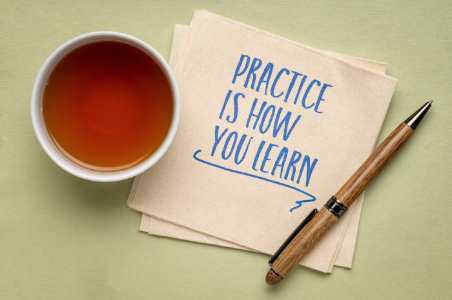
Have you ever wondered how some people seem to get really good at things, whether it’s sports, music, or schoolwork? You might think they were just born with talent, but here’s the truth: most of them get great at what they do by practicing in a very special way. It’s called Deliberate Practice, and I’m going to explain what it is and how YOU can use it to get better at anything you want.
What Is Deliberate Practice?
Let’s start with what practice usually looks like. Maybe you’re learning how to play the piano, or you’re trying to shoot more baskets in basketball. Regular practice might be playing the same song over and over, or just spending hours shooting hoops. That’s fine, but deliberate practice is different. It’s more focused and designed to help you improve specific skills.
Deliberate practice is when you work on the hardest parts of something and push yourself just beyond your comfort zone. It’s not about doing things you’re already good at—it’s about working on the things you struggle with until you master them.
Why Deliberate Practice Works
When you practice something deliberately, your brain is forced to work harder. Think about it like lifting weights for your brain: you have to lift weights that are just a little too heavy to get stronger, right? The same goes for learning new skills. You have to work on what challenges you so your brain grows and adapts.
How to Practice Deliberately
So how can you start using deliberate practice in your life? Here are a few easy steps to follow:
- Pick a Specific Goal: Don’t just say, “I want to get better at math” or “I want to improve at soccer.” Be specific! If you’re working on math, you might say, “I want to get better at solving word problems.” If you’re practicing soccer, it might be, “I want to improve my passing accuracy.” When you focus on something specific, you can measure your progress more easily, and that’s super motivating.
- Focus on What’s Hard: Nobody likes doing things they’re bad at, but that’s exactly what you need to do with deliberate practice. If you want to improve your guitar playing, and you’re bad at playing chords, then that’s what you should focus on. It might be frustrating at first, but that’s where the magic happens. The more you work on what’s hard, the easier it gets over time.
- Get Feedback: You can’t always see your own mistakes. That’s why it’s important to get feedback from someone who knows what they’re doing. This could be a coach, a teacher, or even a friend who’s good at what you’re trying to learn. Feedback helps you figure out what you’re doing wrong, so you can fix it.
- Practice Regularly: Deliberate practice works best when you do it consistently. It’s better to practice for a short time every day than to practice for hours just once in a while. Even 30 minutes a day of focused practice can make a HUGE difference over time.
Example of Deliberate Practice
Let’s say you’re learning to play the violin. Regular practice might be playing through a song you already know just to get more comfortable. But deliberate practice would mean choosing a section of the song that’s difficult—maybe a part where your fingers have to move quickly—and practicing that over and over until you improve.
Or maybe you’re trying to get better at basketball. Regular practice could be just shooting baskets for fun. But deliberate practice would be working on your weak hand (the one you don’t use as much) to dribble or shoot. It’s harder, but that’s what will help you grow the fastest.
Why Is Deliberate Practice So Powerful?
Deliberate practice works because it helps you:
- Improve Faster: You’re focusing on the stuff that’s hard, which means you’re solving the real problems holding you back.
- Avoid Bad Habits: With feedback, you’ll correct mistakes early instead of repeating them over and over.
- Build Confidence: When you see yourself getting better at things that used to be difficult, you’ll feel more confident in your abilities.
How Can You Start?
Here’s how you can start using deliberate practice today:
- Pick one skill you want to improve (playing an instrument, a sport, or even a school subject).
- Set a specific goal for what you want to get better at.
- Work on the hardest parts, even if they’re frustrating at first.
- Get feedback from someone who can help you improve.
- Practice a little bit every day.
You don’t have to spend hours practicing—just make sure you’re practicing smart. Deliberate practice is like the shortcut to becoming really good at anything. So, whether you want to be the best basketball player on your team, ace your math test, or become a great artist, start practicing deliberately and watch yourself improve!
See how a Modern Observer Group coach can help you get started with deliberate practice. Schedule a call here or contact us at the information below. Modern Observer Group programs are based on the Businetiks system as detailed in the book, “The Businetiks Way.”

